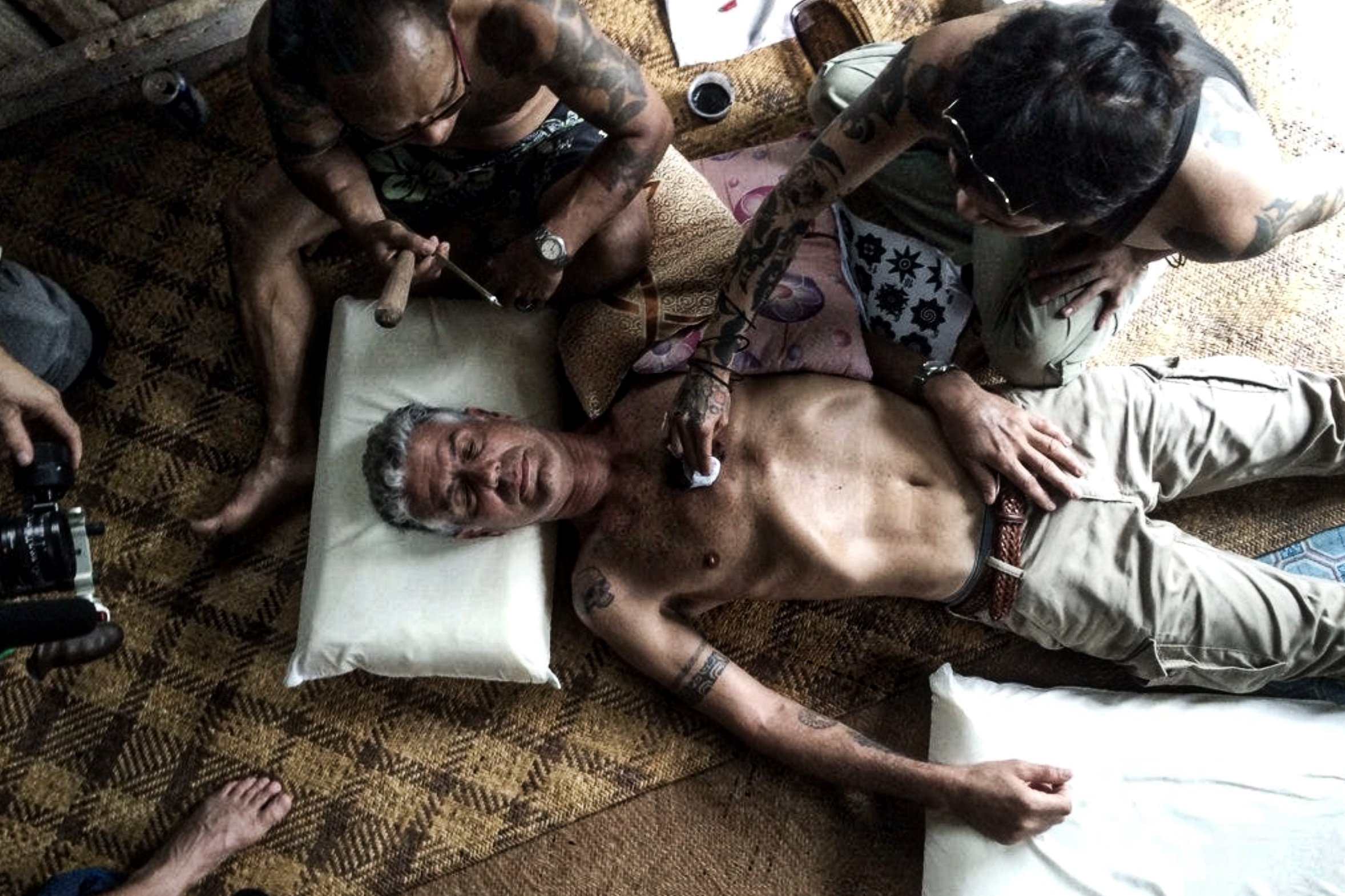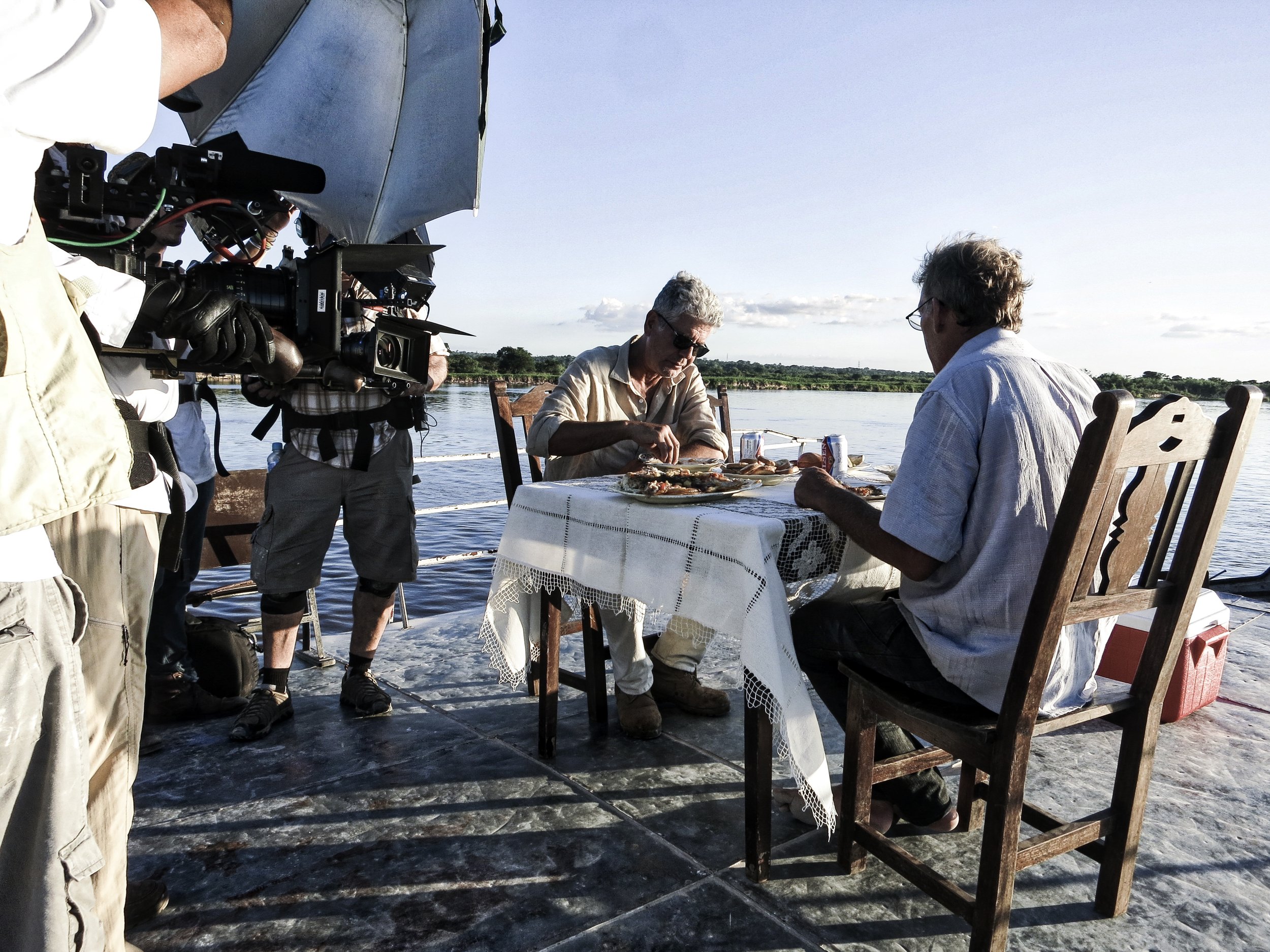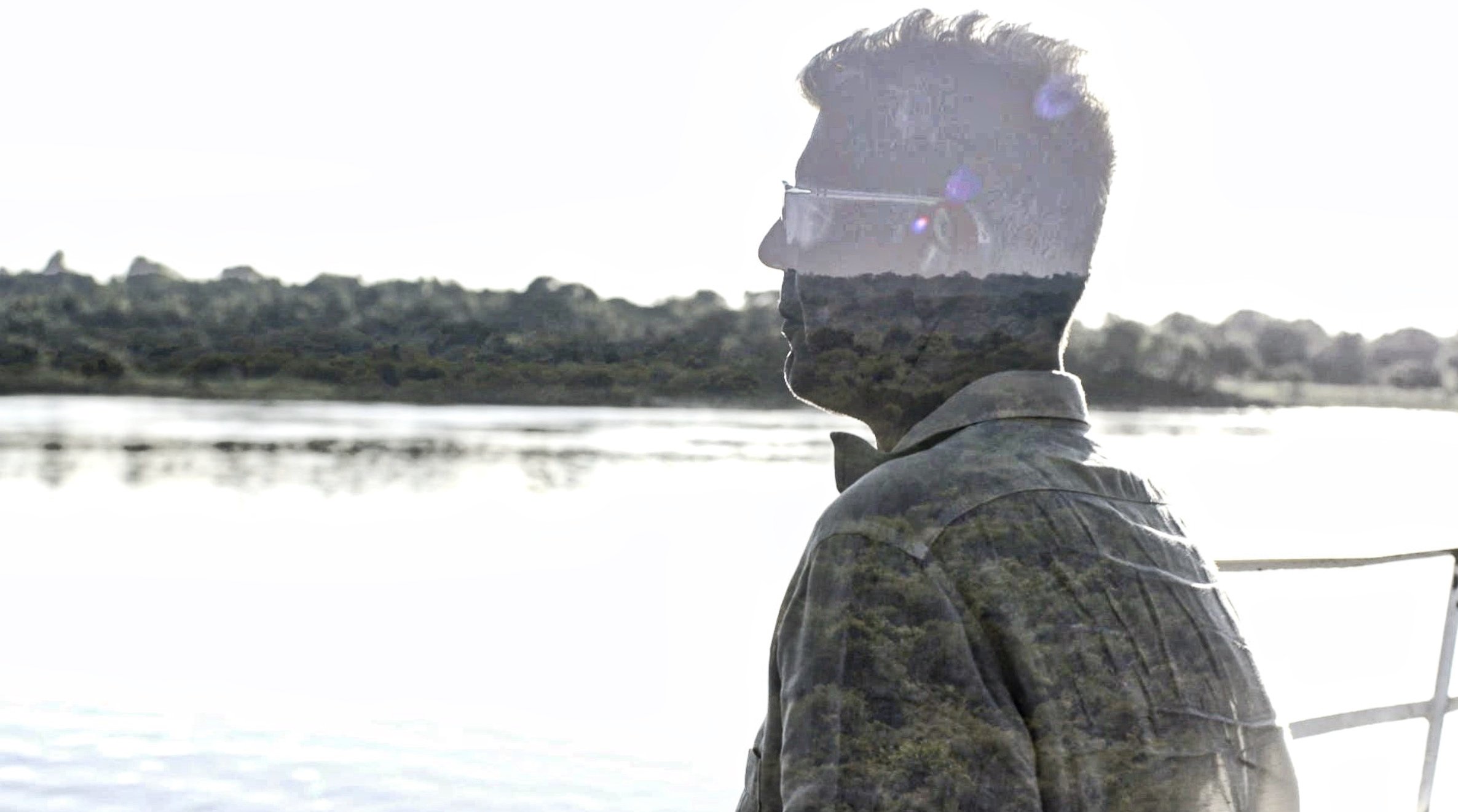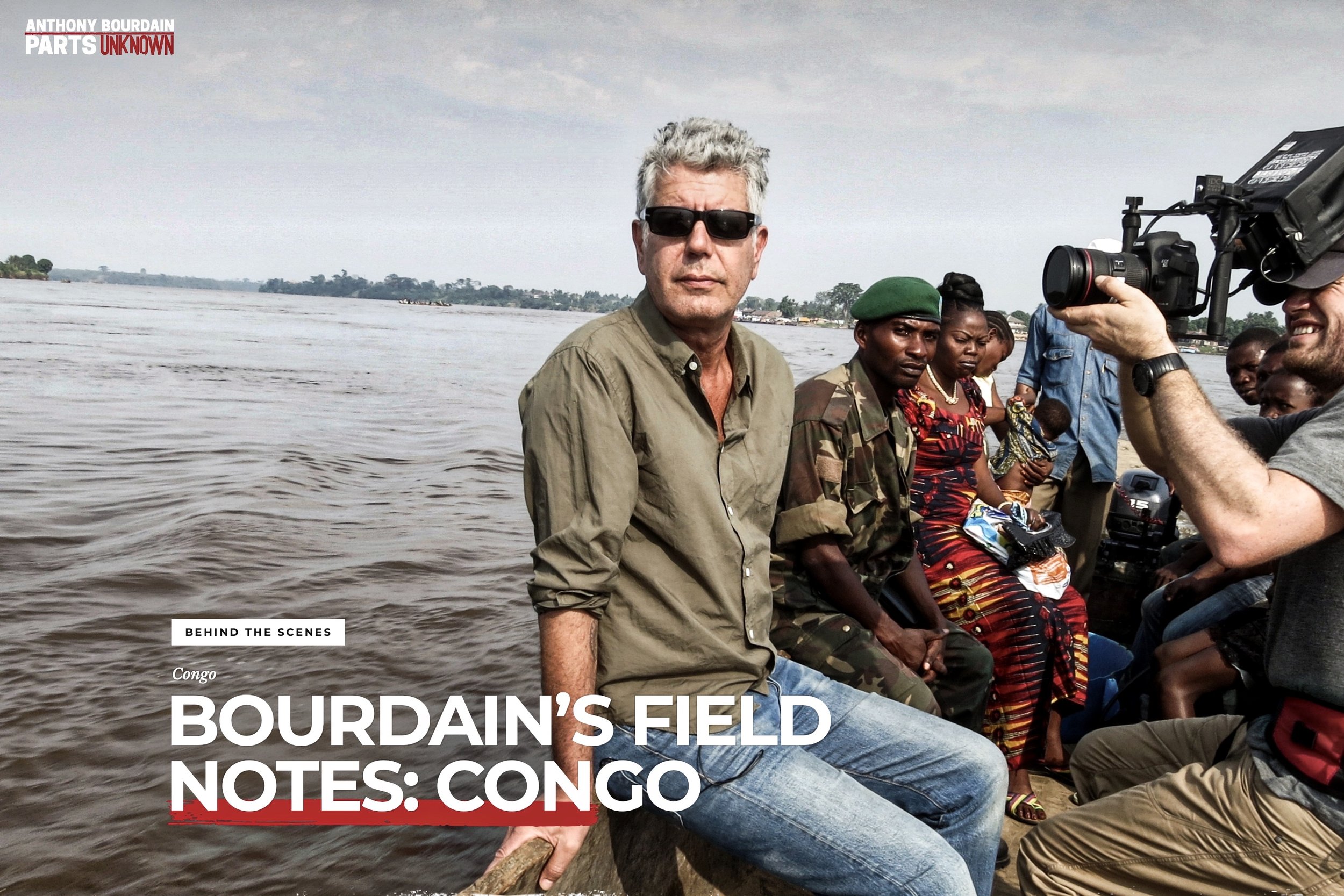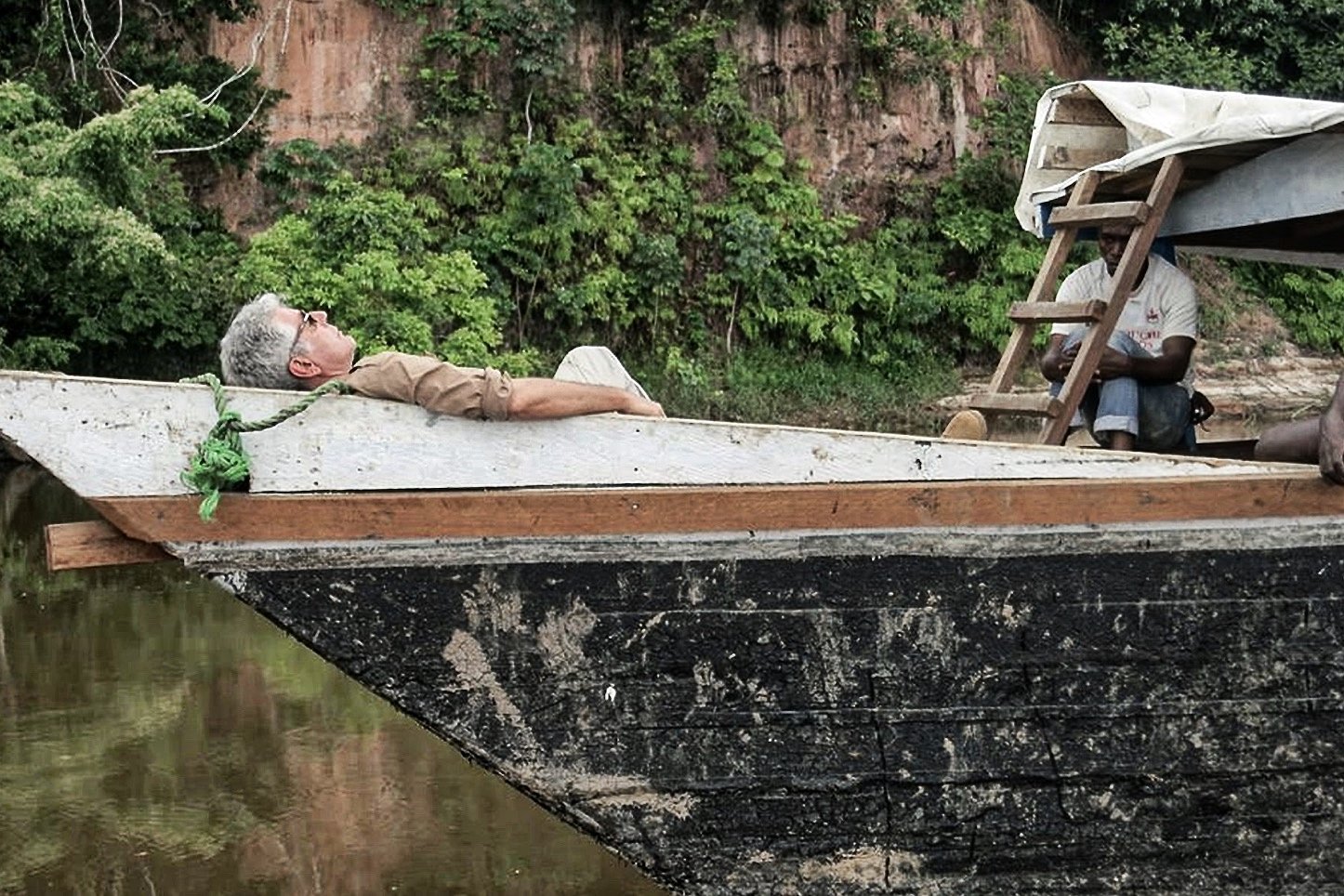“Travel isn’t always pretty … the journey changes you. It should change you.” This was Anthony Bourdain going up the Skrang River in the heart of the Borneo jungle in November 2015.
Borneo was the first episode of Parts Unknown I ever watched. Truthfully, it was the first hour of Bourdain I ever watched.
I was stuck in cattle class on a 12-hour flight to Africa; I had some TV programs loaded on my iPad, and I’d heard good things about this guy, Anthony Bourdain. I wanted to see one of his programs set in the developing world, as opposed to one of his stateside shows — because, let’s face it, while “well done” (pun intended), Bourdain’s stateside settings are familiar to those of us who live in North America. I happened on Borneo quite by accident. It was random selection, as opposed to natural selection.
By then, Bourdain had knocked about the TV world for about 15 years. His first foray into food TV, A Cook’s Tour, debuted on the Food Network in 2000; Borneo aired 15 years later, on CNN’s Parts Unknown.
A Cook’s Tour was the brainchild of then-NYU film graduate Lydia Tenaglia, who was working at New York Times Television at the time.
Tenaglia had read Bourdain’s book sensation Kitchen Confidential. She learned that Bourdain was pitching a Mark Twain-esque Innocents Abroad-type travel journal as a follow-up project.
Much had changed by the time Tenaglia and her production company Zero Point Zero, co-founded with Chris Collins, settled on Parts Unknown for CNN. Those nascent episodes of A Cook’s Tour were filmed on the fly — and a budget — with a pair of Sony PD100 DV camcorders. Not exactly the Sony CineAlta cameras in wide use in the film industry today, but fit for purpose at the time.
For me, Bourdain was somewhat of an unknown when I first watched Borneo.
As a longtime viewer of CNN, going back to the Ted Turner years and before Warner/Discovery messed things up, I assumed Bourdain was some yutz CNN had parachuted in to fill a hole in their primetime schedule.
Obviously, a Bourdain TV show for CNN wasn’t going to be a life-changing, seminal moment in television history — more like a viewing alternative to Dirty Jobs with Mike Rowe. But I was trapped in cattle class on a 12-hour flight to Africa; what else was I going to do? I knew enough at the time to always have an iPad and a decent pair of headphones with me on long flights; the so-called in-flight entertainment on some of those African airlines makes CNN look like Citizen Kane.
So I turned to Borneo, somewhat reluctantly, and within five minutes — literally, that’s all it took — I knew. I was wrong. Bourdain was something special. A creative talent of the first order. Hell, I’m going to stick my neck out here and just say it: Bourdain struck me as the 21st-century equivalent of Mark Twain. Think Innocents Abroad, re-imagined for the Apocalypse Now generation.
The analogy is apt.
The Parts Unknown Borneo, directed and produced by longtime Bourdain director/producer, creative companion and favourite whipping boy Tom Vitale, is structured a lot like the Coppola film, right down to the part where Vitale, as with Coppola on Apocalypse Now, had a near nervous breakdown during filming. More on that in a moment.
The story, and there is one, is simple. A lifelong wanderer and world traveller journeys up a largely unexplored jungle river in search of his destiny and a larger meaning, whatever that might be. Coppola and his fellow screenwriters John Milius and the Vietnam War journalist Michael Herr based their similarly themed screenplay for Apocalypse Now on the Joseph Conrad novella Heart of Darkness, first published in serial form in 1899.
As Vitale explains in his autobiographic book In the Weeds — highly recommended, by the way — “Tony’s first visit to Borneo in 2005 was a trip that had marked a turning point in his life and career, as well as mine. … That trip during the first season of No Reservations had been an emotional one for Tony. His marriage of twenty years was breaking up, and he’d fallen in love again and was feeling unusually poetic around the camera.”
The episode’s theme was inspired by the bejalai, an Iban philosophy about taking a journey of self-discovery. An Indigenous group native to the vast jungles of Borneo, the Iban consider the bejalai central to their culture; the bejalai is a voyage of discovery that every Iban must take. The idea, Vitale writes in In the Weeds, is to go on an adventure, and learn something about the world.
Vitale: “When all is said and done, hopefully, you’re better for what you’ve seen, and you share the knowledge you’ve acquired with your home village. The Iban then commemorate the experience with a hand-tapped tattoo, à la ‘travel leaves marks.’”
It was the perfect metaphor for an hour of TV about travel.
Bourdain had navigated similar emotional terrain in the Parts Unknown episode Congo, from that show’s first season — which, as fortune would have it, was another nightmare-inducing experience for Vitale, though in that one, at least, Bourdain didn’t try to strangle Vitale on the spot. More on that in a moment.
Ten years later, he wanted his own ceremonial tattoo to mark his emotional journey, becoming a new man — older, wiser, more worldly, more sophisticated, and more mature. A remote village of repentant headhunters, hidden in a faraway corner of Borneo’s sweltering jungle of steep, slippery, thorny, leech-infested bush seemed the perfect tonic — pun intended.
This time, though, as recounted in Tom Vitale’s autobiography In the Weeds (seriously, if you’ve not read it, the book is a must), Borneo had changed dramatically, not unlike Bourdain himself.
“Much had changed in the decade since Tony’s last visit,” Vitale wrote. “The old longhouse where the whole Iban village lived together under one roof in apartments off a communal hallway had been torn down and replaced by a newer one. The tribe had converted to Christianity and been convinced to bury their bouquet of skulls.
Much of the jungle had been clear-cut by loggers, and Itam [Bourdain’s guide from the No Reservations expedition ten years earlier] was dead.”
The shoot was arduous from the very beginning, nothing like the experience from a decade earlier.
Vitale: “We had decided to devote half the shoot to [the Iban festival] Gawai, but nothing was happening aside from repetitive drinking. At Gawai, everyone drinks. Kids, adults, the village elders, and especially honoured guests like us. Every five feet, you’re obliged to accept another shot of lankau, a homemade rice whiskey only marginally lower octane than jet fuel and known to induce mildly hallucinogenic effects. It’s considered an insult to refuse, which is probably why our travel doctor here in case of emergency was lying passed out drunk on the floor.
“In addition to that, I’d discovered that the translator-sidekick I’d brought along to the drinking festival was a recovering alcoholic and didn’t drink. Which didn’t really matter because, as it turned out, he also didn’t speak Iban. And none of the Iban spoke English.
“As if that weren’t enough, I didn’t have much to visually connect this visit to Itam—the narrative backbone of the episode.
“Worst of all, Tony had decided he didn’t want to go through with the Bejalai tattoo scene (after all). I was counting on that damn tattoo.”
Matters went from bad to worse.
Vitale stumbled over Itam’s widow, now 95, in the middle of the night, and realized he had an opportune moment to finally string things together — only he couldn’t find a cameraman. Or a camera.
“Ninety-five years old, she was knocking back shots from a handle of Johnnie Walker Blue with her preschool-age great-grandson. Now, that might have been a useful shot to bring back to New York, but, of course, there were no cameras to be found.”
Vitale confesses he had a few shots of his own by then, and not being a drinker by nature or habit, this was a very, very bad idea — especially in that heat and humidity.
Vitale came across the crew drinking with Bourdain in a ceremonial tent for that purpose, and to put it as delicately as possible, he lost it.
“Without question, I shouldn’t have had so much to drink, and I was totally out of line to speak that way to the crew. But my biggest mistake was doing it in front of Tony. I’d been pushing him for content all day, which always got under his skin. But drunken behaviour and being ‘uncool’ was even worse. Quite drunk himself, Tony got to his feet and yelled, ‘That is f**king it! You’re done, demoted! … if I see you one more time tonight, you’re off the show! For good. Now get upstairs to your room and sleep it off.””
There was just one problem: Vitale did allow himself to be seen by Bourdain again that night, no more than twenty minutes later, and that’s when Bourdain launched himself on top of him and tried to throttle him on the spot.
“I wanted to believe we’d been on a Bejalai, but deep down, I was terrified the last decade had just been aimless wandering while making a TV show,” Vitate recalled. “On some level, I’d convinced myself the tattoo would be proof there was meaning in the chaos.”
Being strangled alive in the middle of a jungle night halfway around the world was not exactly the meaning he was after, though, and at that point it looked as if Parts Unknown was going to cause ZPZ and CNN a very big headache indeed.
Here’s the genius part, though.
Much as with Coppola during the making of Apocalypse Now — and, before that, Conrad in writing Heart of Darkness, the remote jungle setting coupled with the dark night, heat, humidity, biting flies, leeches, copious quantities of alcohol and emotional turmoil inspired revelatory soul-searching, and some of the best voiceover Bourdain would ever compose.
On that first visit to Borneo a decade earlier for No Reservations, Bourdain ruminated about the nature of travel in a moment of reflection, soul-searching, and lucidness.
It was, Vitale recalled, the single best quote about travel he had ever witnessed … from anyone, anywhere.
The footage was unusable, though, thanks to “the unrelenting barking of a dog in the background!” and it never made it into the final cut.
Vitale had the presence of mind to transcribe what Bourdain said, however, and it’s just as well he did. At the end of the Parts Unknown episode, a now-sober Vitale persuaded a now-sober Bourdain — post-murder attempt — to voice those words again for the episode-closing voiceover.
It’s his favourite quote about travel, Vitale wrote in In the Weeds, worthy of anything in Paul Theroux’s 2011 travel-quote anthology, The Tao of Travel.
Bourdain:
“Travel isn’t always pretty. It isn’t always comfortable. Sometimes it hurts; it even breaks your heart. But that’s okay. The journey changes you; it should change you. It leaves marks on your memory, on your consciousness, on your heart, and on your body. You take something with you. Hopefully, you leave something good behind.”
Hail and amen.
Supplementary reading:
https://medium.com/parts-unknown/happy-gawai-5d54df41338c
https://explorepartsunknown.com/borneo/episode-intel-from-borneo/


